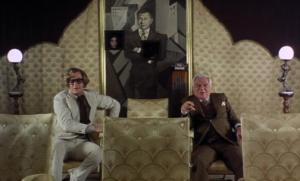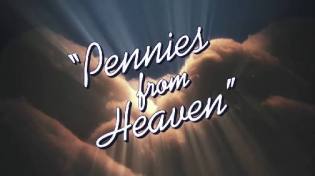 When I was a child, nobody seemed to give a fuck about what I saw. I’m not sure if my father knew that movies even had ratings, and the ticket-takers at the Manor (the movie theater within walking/biking distance from my house) only seemed to care if you had the $2 required for entry. While it may seem crazy these days, they left parenting duties to the parents.
When I was a child, nobody seemed to give a fuck about what I saw. I’m not sure if my father knew that movies even had ratings, and the ticket-takers at the Manor (the movie theater within walking/biking distance from my house) only seemed to care if you had the $2 required for entry. While it may seem crazy these days, they left parenting duties to the parents.
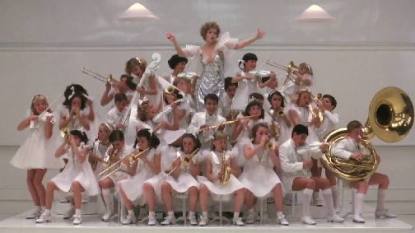 This leniency, matched with my budding obsession with the movies, led me to see lots of things not meant for my young eyes. For instance, Halloween — which I thought was going to have lots of witches and frankensteins — which I probably “saw” when I was six. I put “saw” in quotes because I only saw about 20 minutes of it, the rest I listened to from the lobby. But for all the early journeys into the dark, dangerous landscape of adult cinema, I only look back to one movie that I was probably too young to see.
This leniency, matched with my budding obsession with the movies, led me to see lots of things not meant for my young eyes. For instance, Halloween — which I thought was going to have lots of witches and frankensteins — which I probably “saw” when I was six. I put “saw” in quotes because I only saw about 20 minutes of it, the rest I listened to from the lobby. But for all the early journeys into the dark, dangerous landscape of adult cinema, I only look back to one movie that I was probably too young to see.
Keep in mind that while Pennies from Heaven has a ‘R’ rating, it’s not a 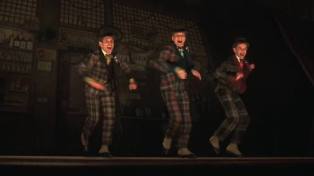 particularly hard ‘R,’ nor is it terribly salacious. It’s a musical for crying out loud. The initial attraction was the re-teaming of Steve Martin and Bernadette Peters, who previously co-starred in The Jerk, an occasionally really juvenile comedy that greatly appealed to my really juvenile self. But after about 15 minutes, it became clear to me that Pennies From Heaven wasn’t The Jerk by a longshot.
particularly hard ‘R,’ nor is it terribly salacious. It’s a musical for crying out loud. The initial attraction was the re-teaming of Steve Martin and Bernadette Peters, who previously co-starred in The Jerk, an occasionally really juvenile comedy that greatly appealed to my really juvenile self. But after about 15 minutes, it became clear to me that Pennies From Heaven wasn’t The Jerk by a longshot.
Based on Dennis Potter’s BBC mini-series (which I haven’t seen, so I can’t make any comparisons), PFH adheres to the old musical maxim of when characters can no longer speak, they sing. When they can no longer walk, they dance. The major difference being, they lip-sync to previously recorded versions of the songs of the time-period (the depression). So, while PFH wasn’t The Jerk, it wasn’t exactly Singin’ in the Rain either.
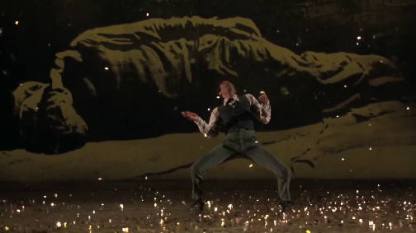 What it was (and still is), was something my seven or eight-year-old brain had a really hard time processing. I remember walking out of theater not feeling that I got what I spent $2 for, but completely unsure what the fuck I did just get. In fact, I didn’t truly figure that out until I re-watched the movie a couple of years ago. It was also at this point that I realized just how too young I was the first time around.
What it was (and still is), was something my seven or eight-year-old brain had a really hard time processing. I remember walking out of theater not feeling that I got what I spent $2 for, but completely unsure what the fuck I did just get. In fact, I didn’t truly figure that out until I re-watched the movie a couple of years ago. It was also at this point that I realized just how too young I was the first time around.
Directed by Herbert Ross, who at the time was mostly know for his Neil Simon adaptations, but also an early (and somewhat disastrous) foray into the movie musical with Goodbye, Mr. Chips. While ‘Chips’ attempted a naturalistic approach, PFH is a classic MGM production in (almost) every sense. It’s lavish, handsome, and every interior isn’t even trying to convince you that you’re looking at anything but a soundstage. Which is entirely the point, in that, it’s a musical about the idea of musicals. Or more acutely, how escapist fare intersects with reality. Or, how it doesn’t…
Plainly put, a seven-year-old me went to the theater expecting laughs and instead 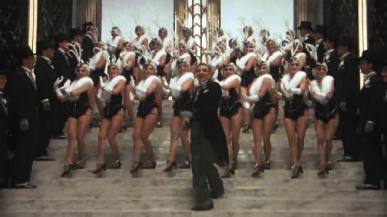 got a quasi-musical about existential disappointment. Looking back, I now realize that my difficulty processing such a thing actually became a pretty formative experience for better or worse. Like the heroes of the movie, I too was seeking escape in a dark room with strangers (although at that age, that hunt was purely subconscious). And like the heroes, I too was quietly crushed when I had to make my way back into the real world, and found my means of escape to be fabrication. Michael Myers scared the shit out of me, but Pennies from Heaven was frighting on a much deeper level.
got a quasi-musical about existential disappointment. Looking back, I now realize that my difficulty processing such a thing actually became a pretty formative experience for better or worse. Like the heroes of the movie, I too was seeking escape in a dark room with strangers (although at that age, that hunt was purely subconscious). And like the heroes, I too was quietly crushed when I had to make my way back into the real world, and found my means of escape to be fabrication. Michael Myers scared the shit out of me, but Pennies from Heaven was frighting on a much deeper level.
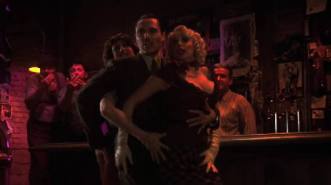 Anyway, enough childhood trauma, as reasonable adults PFH is a hell of a movie. Not only informed ny Fred, Ginger, and Busby Berkley. But also Reginald Marsh, and Edward Hopper. It’s the kind of movie that stops dead for Christopher Walken to do a striptease to “Let’s Misbehave'” yet doing such a thing doesn’t seem odd in the slightest.
Anyway, enough childhood trauma, as reasonable adults PFH is a hell of a movie. Not only informed ny Fred, Ginger, and Busby Berkley. But also Reginald Marsh, and Edward Hopper. It’s the kind of movie that stops dead for Christopher Walken to do a striptease to “Let’s Misbehave'” yet doing such a thing doesn’t seem odd in the slightest.
Ross feverishly channels the stuff he grew up on. Not only the flash of Berkley, 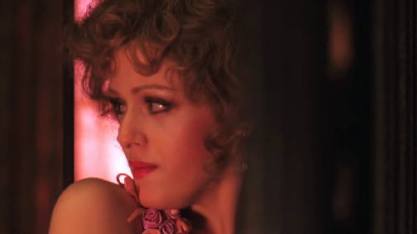 but the mordant chuckles of LaCava, and the sweaty melodrama and deep shadows of Dmytryk. Resulting in probably the most un-’80s movie of the ’80s in terms of look and feel (I don’t think there’s any beige to be found anywhere). While Martin in his first outing that’s not straight clowning, gives his unrepentant horn-dog of a hero the innocence of a nation — It’s all still possible. So while he may deserve what he gets, his (and our) march towards doom still stings.
but the mordant chuckles of LaCava, and the sweaty melodrama and deep shadows of Dmytryk. Resulting in probably the most un-’80s movie of the ’80s in terms of look and feel (I don’t think there’s any beige to be found anywhere). While Martin in his first outing that’s not straight clowning, gives his unrepentant horn-dog of a hero the innocence of a nation — It’s all still possible. So while he may deserve what he gets, his (and our) march towards doom still stings.
So, an existential post-musical? I’m not sure. However you choose to classify it, for discerning adults only, Pennies From Heaven sings it’s heart out.

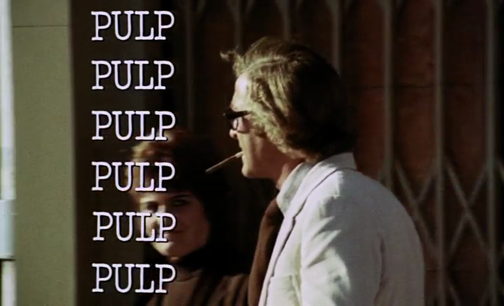
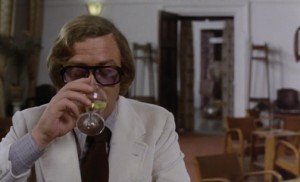 line 20 years prior… almost. Michael Caine plays Mickey King, a man who flew the coop on his life of british domesticity and landed in the Mediterranean. There, he pays the rent by authoring cheap, quick, and dirty detective fiction, the titles of which I won’t spoil here. Nor will I spoil the various pseudonyms he uses on the byline. Mickey squeezes out the few drops of glamour contained within his lifestyle and job, donning a white suit that could probably use a spin at the dry cleaners, wearing large, purple-tinted glasses, and smoking small, plastic tipped cigars. His station in life may not be high, but he seems comfortable in it’s lowness. Then there’s the knock at the door…
line 20 years prior… almost. Michael Caine plays Mickey King, a man who flew the coop on his life of british domesticity and landed in the Mediterranean. There, he pays the rent by authoring cheap, quick, and dirty detective fiction, the titles of which I won’t spoil here. Nor will I spoil the various pseudonyms he uses on the byline. Mickey squeezes out the few drops of glamour contained within his lifestyle and job, donning a white suit that could probably use a spin at the dry cleaners, wearing large, purple-tinted glasses, and smoking small, plastic tipped cigars. His station in life may not be high, but he seems comfortable in it’s lowness. Then there’s the knock at the door…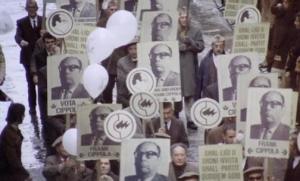 So while the set-up is basic — albeit a little off, Hodges makes it apparent pretty quickly that there’s something else going on here. As Mickey navigates his way to a promised paycheck, the walls of the city behind him are plastered with the visage of a Prince Cippola (Victor Mercieca) who seems to be running for office under a “law and order” stance. At one point, Mickey runs into a campaign parade/march for the man. The parallels Prince Borghese and his “law and order” Spada movement of the time can be drawn pretty clearly, and this is no coincidence. Cippola’s “parade” even marches along to the soundtrack of a recorded speech by Mussolini. Yeah, there’s definitely something else going on here…
So while the set-up is basic — albeit a little off, Hodges makes it apparent pretty quickly that there’s something else going on here. As Mickey navigates his way to a promised paycheck, the walls of the city behind him are plastered with the visage of a Prince Cippola (Victor Mercieca) who seems to be running for office under a “law and order” stance. At one point, Mickey runs into a campaign parade/march for the man. The parallels Prince Borghese and his “law and order” Spada movement of the time can be drawn pretty clearly, and this is no coincidence. Cippola’s “parade” even marches along to the soundtrack of a recorded speech by Mussolini. Yeah, there’s definitely something else going on here…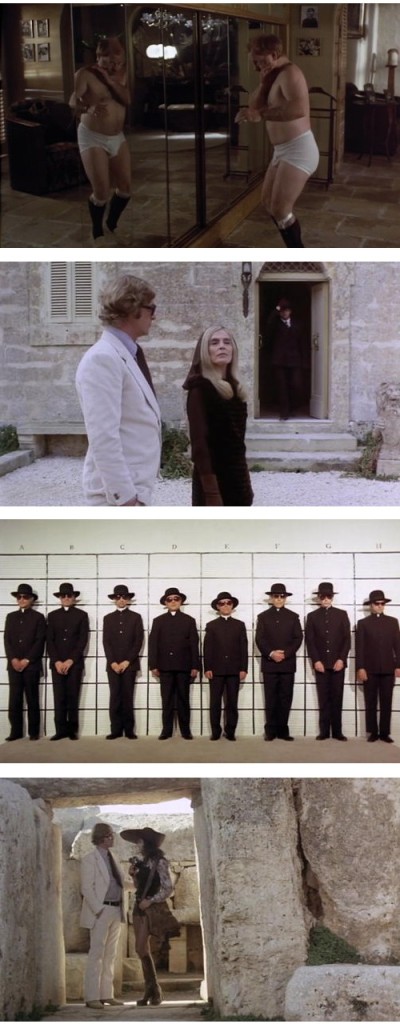 Exactly what that is, I allow you to discover on your own. But it’s what makes Pulp such a rare and remarkable film. It’s a comedy that’s topical and direct while still managing to be very funny. Hodges even wanted to film in Italy further blurring the line between fact and fiction, but discovered that mafia kick-backs for locations (a behind the scenes irony for a movie filled with on-screen ironies) would have bled the production dry. Thus, moving the production south to Hodges’ old vacation spot of Malta.
Exactly what that is, I allow you to discover on your own. But it’s what makes Pulp such a rare and remarkable film. It’s a comedy that’s topical and direct while still managing to be very funny. Hodges even wanted to film in Italy further blurring the line between fact and fiction, but discovered that mafia kick-backs for locations (a behind the scenes irony for a movie filled with on-screen ironies) would have bled the production dry. Thus, moving the production south to Hodges’ old vacation spot of Malta.